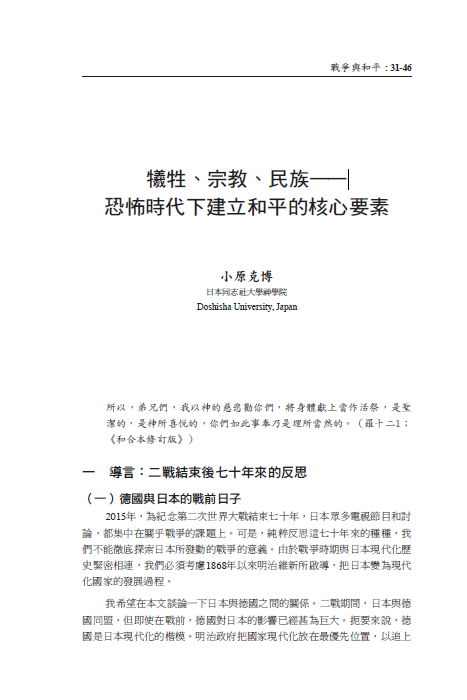犧牲、宗教、民族—— 恐怖時代下建立和平的核心要素/小原克博
小原克博
撮 要
當我們討論戰爭與和平具體的方面時,需要認真思考其中一個關鍵詞「犧牲」,因為犧牲的概念往往被利用來鼓動民族主義與正義戰爭。有些時候,為一些高尚原因而死,被視為合理。事實上,在戰爭中為國陣亡的人,會受表揚為犧牲高尚。同樣,為神而死的人受歌頌為烈士。國家與宗教信奉為某些高尚使命而死的邏輯。這共通之處往往導致民族主義和宗教的結合。換言之,宗教的作用可以補充一個國家所需的犧牲邏輯。回應這樣一種犧牲邏輯,和平主義應當比純粹理想主義更具體充實。反戰者必須冷靜分析戰時眾多犧牲背後的邏輯,並根據從歷史學到的功課而採取行動,包括道歉與復和。筆者在這篇論文裏,將集中在「犧牲」這關鍵詞,討論國家、宗教與戰爭之間的關係,並會檢視用來合理犧牲的崇拜偶像邏輯,和提供我們必須採納的角度來達致和平。
ABSTRACT
“Sacrifice” is one of the keywords that require serious consideration when discussing specific aspects of war and peace, because the concept of sacrifice has often been used to raise nationalism and justify war. The act of dying for some noble cause is sometimes regarded as justifiable. In fact, people who died for their country during war were praised for their noble sacrifices. Similarly, people who die for God are praised as martyrs. The logic in praising death for some noble mission is embraced by both nations and religions, and this commonality has often led to the combination of nationalism and religion. In other words, religions can serve to complement the logic of sacrifice required by a nation. To address such a logic of sacrifice, pacifism should be more substantial than mere idealism. Pacifists must calmly analyze the logic behind a great many sacrifices during wartime and start to take action based on the lessons learned from history, including offering apologies and reconciliation. In this paper, I will discuss the relationship among nations, religions and war, centering on the keyword of “sacrifice.” I will also examine idolatry as a logic used to justify sacrifice, and offer perspectives we
should adopt to achieve peace.
原載於《建道學刊》46期(2016年7月),頁31-46。
Latest Articles
新手牧者研究計劃(三):新手牧者的身心靈狀態 / 盧慧儀
2025 年 11 月 19 日
個體與關係:滕近輝思想中「深化」的靈性觀 / 倪步曉
2025 年 11 月 18 日
香港九龍塘基督教中華宣道會之起源和發展史/陳智衡
2025 年 10 月 20 日
Highlights
[電子書]困境與抉擇:「建道研究中心30週年誌慶」跨學科研討會論文集/廖炳堂、倪步曉主編
2025 年 1 月 2 日
從梧州到長洲:建道神學院125年的挑戰與恩典 / 陳智衡
2023 年 10 月 1 日
微小教會的見證/高銘謙
2023 年 6 月 1 日







